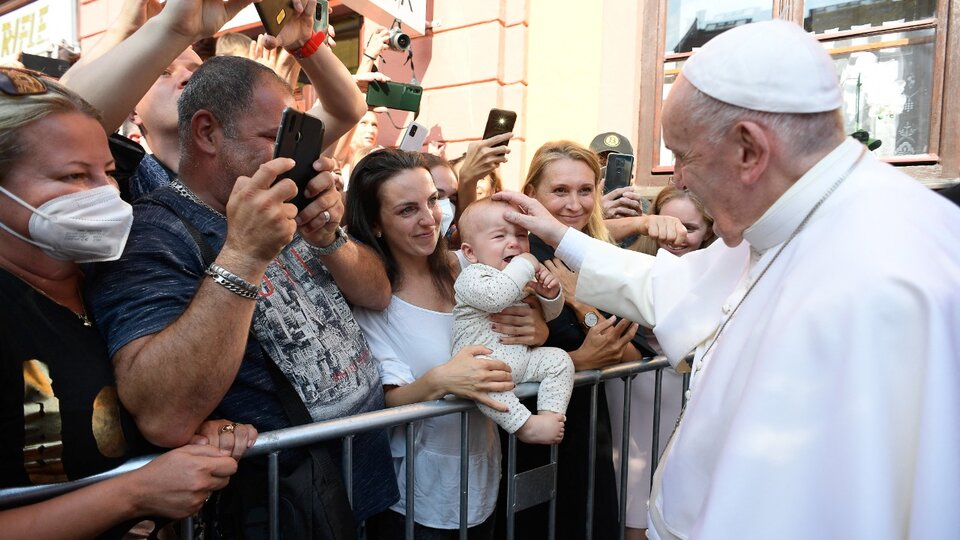
[ad_1]
Pope Francis criticized the discriminatory stereotypes suffered by the Roma community and said that “marginalizing people does not solve anything”. The pontiff also claimed the importance of integration during his visit to the Slovak quarter of Lunik IX, considered the largest Gypsy center in Europe.
“Dear brothers and sisters, you have too often been subjected to preconceived ideas and ruthless judgments, discriminatory stereotypes, defamatory words and gestures,” said the pontiff at Lunik IX, located in the city of Kosice, the second largest city in Slovakia. the Pope arrived on Sunday for a four-day tour.
“In this way, we have all become poorer, poor in humanity. What we need is to regain dignity and to move from prejudices to dialogue, from closure to integration,” added Jorge Bergoglio. . More than four thousand people live in the Lunik IX district, including 800 children, while it has capacity for only half of the inhabitants.
From the windows of the houses, you could see posters that said “Francisco welcome among us”. Before the Pope’s arrival, gypsies of all ages sang and danced in typical costumes outside the complex of three and six story buildings where they live.
“Marginalizing people doesn’t solve anything”
“Judgments and prejudices only increase distances. Conflicts and strong words do not help. Marginalizing people does not solve anything,” insisted the Pope. According to official Slovak figures, around eight percent of the 5.5 million inhabitants are of Roma origin, and around 20 percent of them live in extreme poverty in more than 600 neighborhoods like Lunik IX. Half of the 440,000 people of the Roma community live without drinking water in neighborhoods like the one the pontiff visited.
Deputy Prime Minister Veronika Remisova spoke about the numbers of poverty in the Roma community. “This is a huge number that we cannot ignore. Neighborhood coexistence is not always easy, but without humanity and without real interest for others, we will not move forward,” he said on social networks during the Pope’s visit.
For Peter Besenyei, responsible for the local Salesian community and pastoral responsible for the gypsies of the Archdiocese of Kosice, “It’s great that the Holy Father is coming to a place where no one wants to go”. “It is difficult to find teachers at Lunik IX, priests ready to work, and the Pope comes in this difficult environment”he added.
Lunik IX
The district of Lunik IX was built in the late 1970s. The neighborhood was originally intended for members of the army and security forces during the Communist era. However, with the economic and social crisis that began to affect what was then Czechoslovakia, it became a place of concentration for Roma families.
In addition to the Roma community living in Lunik IX, those from Jarovnice, in the Sabinov district, also participated, which will also be part of the mass that the pontiff will celebrate on Wednesday before his return to Rome. “We have come to see the Holy Father because we want to thank him for being here. He is a great man with a good heart,” said Jana Ginová, one of the pilgrims who came to Kosice.
City spokesman Vladimir Fabian explained that residents had the option to register to be in public, but many did not. For safety reasons, they were asked to stay in the buildings, although they allowed a corridor allowing them to move around the surroundings. Father Marian Deahos, a Salesian who works with the gypsies from another neighborhood, explained that generally for the Roma community the priest who is with them is important and that the Pope “does not matter to them”. While awaiting the arrival of the pontiff, gypsies of all ages sang and danced in typical costumes in front of the complex of three and six storey buildings that make up the Slovak Quarter. Sitting in the front row, Slovak Prime Minister Eduard Heger also joined in the dances and songs of the Roma (Gypsy) community
“Thanks”
“You have a lot of love and respect for the family, and they look at the Church from this experience ”, affirmed the Pope, in response to the reception he had in the gypsy community. Yes, the Church is at home, it is their home. That is why – I would like to tell you this with my heart – you are welcome, always feel at home in the Church and never be afraid to be here. May no one leave you or anyone else outside the Church! “Bergoglio added in this context.
The Roma community is considered the most populous ethnic minority on the continent, especially in Central and Eastern Europe. According to historians, half a million Roma were killed by the Nazis during World War II, the equivalent of a quarter of the population.
At present, discrimination against the Roma population persists. According to Iveta Duchonova, head of the office of the government delegate for this community, “in 2016, an EU report on minorities and discrimination found that 54% of Roma in Slovakia had been discriminated against because of their ethnicity” . In 2020, Amnesty International denounced that the situation of gypsies worsened during the covid-19 pandemic, when they were discriminated against because they were considered “a threat to public health”.
.
[ad_2]
Source link
 Naaju Breaking News, Live Updates, Latest Headlines, Viral News, Top Stories, Trending Topics, Videos
Naaju Breaking News, Live Updates, Latest Headlines, Viral News, Top Stories, Trending Topics, Videos